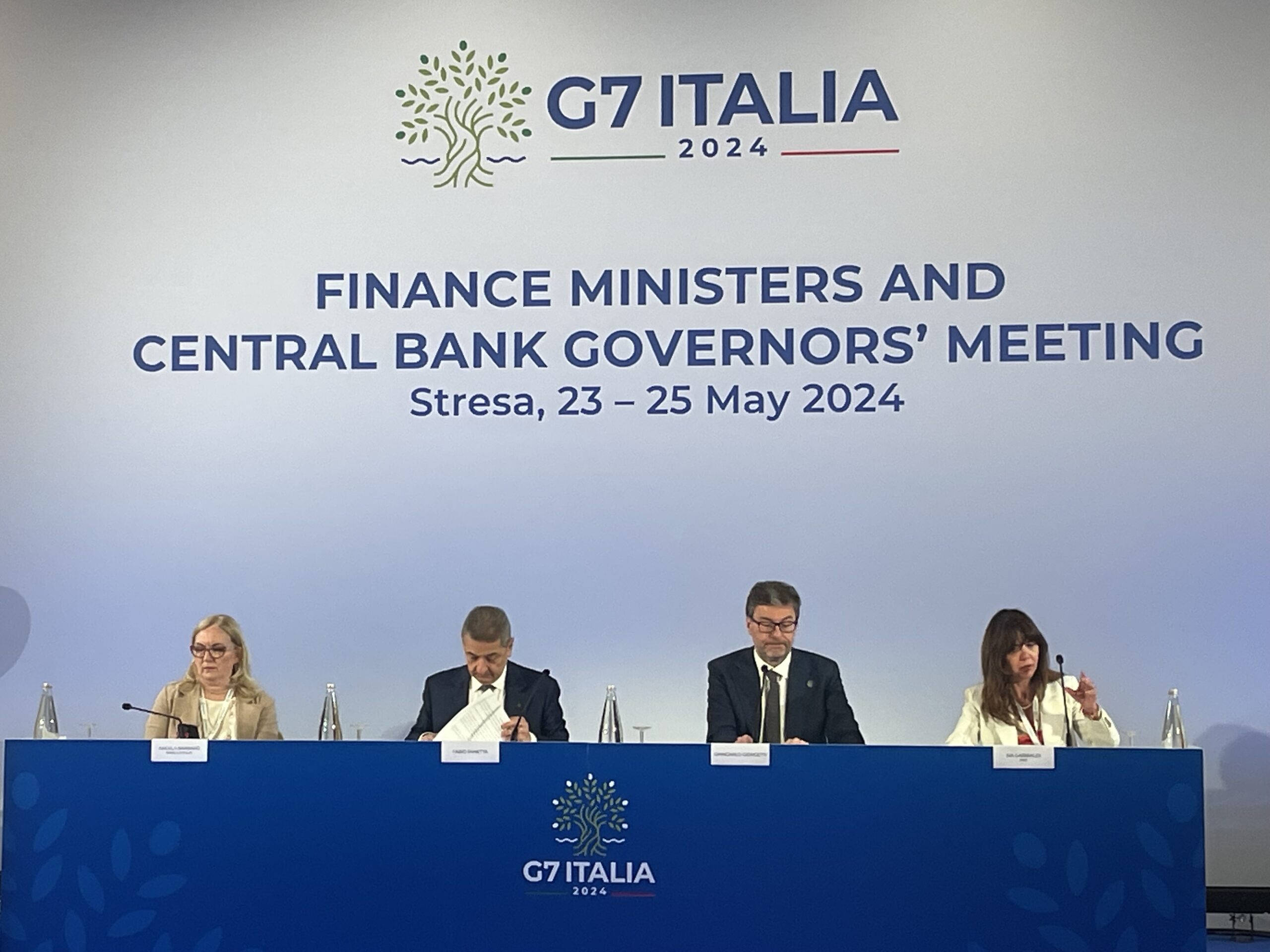SATURDAY 25 MAY 2024 – STRESA – The G7 Finance meeting of G7 Finance Ministers and Central Bank Governors, held in Stresa from 23 to 25 May 2024, has come to an end.
The main results of the Stresa Communiqué include:
-
- IDA: The G7 show support for a successful 21st replenishment of the International Development Association (IDA) by the end of the year through “policy and financing package that delivers ambitious outcomes”, but no concrete signal on crossing the critical $100 billion threshold as asked for by the World Bank, and $120 billion expected by African Leaders.
- Debt: The G7 recognise the debt challenges faced by many low- and middle-income countries and the need to improve the Common Framework but falls short of acknowledging the necessity for a different approach, including more debt relief and a comprehensive debt restructuring package. They welcome the development of climate resilience clauses.
- Reforms of MDBs: The G7 reaffirms their commitment to enhance and reform Multilateral Development Banks (MDBs), aligning with G20 objectives, for better, larger, and more effective MDBs. They welcome and urge continued implementation of the G20 Capital Adequacy Framework (CAF) including working with credit rating agencies to better reflect the value of callable capital and unlock further new financing. G20 CAF implementation will also set the scene for any general capital increase as determined by MDB boards and management. They welcomed the general capital increases at EBRD and IDB Invest and look forward to the general callable capital increase at the AfDB.
- International taxation: The G7 aims to conclude negotiations on reallocating taxing rights on the profits of the largest multinationals (Pillar One) by the end of June 2024 and welcomes progress on the global minimum tax (Pillar Two). They established parameters of action within the UN Framework Convention on International Tax Cooperation and show openness to participating in discussions on the proposal of the G20 Brazilian Presidency regarding taxing the wealthiest individuals. The G7 also adopted the 2024 Progress Report on Tax Cooperation.
- Managing the green transition and climate impacts: The G7 adopted two new frameworks, the Finance Track Menu of Policy Options for a Just Transition (for the summary see here), which offers non-binding options for domestic and international mitigation strategies; and the High-Level Framework for Public-Private Insurance Programmes against Natural Hazards (for the summary see here), aimed at reducing the insurance protection gap through stakeholder-inclusive public-private partnerships for better adaptation to catastrophic events.
- Transition Plans: The communiqué highlights the necessity of mobilising both public and private investments to drive the global transition towards a net-zero economy. The G7 reiterates the need for available, comparable data and credible, science-based transition plans. Emphasising consistent frameworks for transition plans in both the real economy and financial institutions is a notable advancement. As in previous communiquès, they support the International Sustainability Standards Board (ISSB)’s development of a common framework for sustainability reporting and climate-related disclosures.
- Initiatives for Africa: The communique includes 3 initiatives for African development: the African Vaccine Manufacturing Accelerator (AVMA), the Resilient and Inclusive Supply-chain Enhancement (RISE) partnership, and the Alliance for Green Infrastructure in Africa (AGIA), with a commitment to contributing $150 million in grants, concessional and commercial capital and to mobilising $3 billion of private sector investment in green infrastructures in Africa.
- Most notable gaps: No reference to Special Drawing Rights (SDRs) including the IMF decision that approves the use of SDRs for the acquisition of hybrid capital instruments issued by prescribed holders, New Collective Quantified Goal on Climate Finance (NCQG) to be agreed at COP29 in Baku, or to Fossil Fuels Subsidies, despite the G7 goal of phasing out them by 2025, in contrast to text of the G7 Climate, Energy and Environment Communiqué of the end of April.
Luca Bergamaschi, co-Founding Director at ECCO think tank:
“While solutions for a just transition and better managing climate impacts were front and central, commitments to increase finance for climate and development were underwhelming, despite signals of wanting to do more and better. Without G7 Leaders unlocking new commitments to increase and mobilise investments in public goods at scale, we risk an ever more fragmented, unsafe and distrustful world.”
Laurence Tubiana, CEO of the European Climate Foundation
“The G7 commitment from Finance Ministers to work with Brazil on a progressive and fair taxation for individuals is encouraging. But we need to see that global flows are addressed too, and a firmer commitment from G7 Leaders that they are willing to agree to a concrete proposal at the G20 Summit in November”.
Eleonora Cogo, Senior Associate International Finance, at ECCO think tank:
“Concrete support for a successful refinancing of the World Bank’s IDA is crucial, as it serves as one of the largest sources of concessional finance for the most vulnerable countries and is a lifeline for many debt-distressed nations, especially at a time when other sources of funding are in decline.”
David Ryfisch, Head of Futureproof Finance at Germanwatch:
“The G7 Finance Ministers missed the opportunity to create better conditions for the upcoming negotiations on the new climate finance target for the period after 2025 (NCQG), which is the critical outcome of COP29 in Baku. Worse still, they have failed to mention the target altogether, thereby ignoring its importance. The urgently needed trust building with the most vulnerable is only becoming more difficult.“
Chiara Mariotti, Senior Advisor International Finance, at ECCO think tank:
“Too little too late on the critical question of debt. We need to see Leaders stepping up and acknowledge the Common Framework’s limitations in restoring debt sustainability for crisis-stricken nations. A renewed partnership and diverse forms of debt relief are urgently needed. While we welcome the recognition of Climate Resilient Debt Clauses (CRDC), we need to see the adoption of innovative tools addressing both debt and climate risks. We urge G7 Leaders to explore and leverage instruments for SDR rechanneling, including through MDBs as recently approved by the IMF. It is a shame that G7 Finance Ministers didn’t recognise this important step forward by the IMF.”
Amy Dodd, independent advisor on financial system reforms:
“G7 Ministers rightly emphasised the importance of ambitious and continued reform of MDBs, including their capital adequacy frameworks, both to unlock new affordable financing and to leverage any future contributions. But we need to see more and faster progress on concrete areas like callable capital to really deliver the scale of change and financing the G20 CAF review promised.”
Sima Kammourieh, Programme Lead on international sustainable finance at E3G:
“The Stresa communiqué reflects a much-needed realisation that addressing climate change adequately will require rethinking and reshaping economic and financial strategies. The menu of options for a just transition adopted today is welcome and will have to serve as a live document and regularly revisited roadmap as G7 countries and beyond engage more deeply in their transitions. It is particularly positive that G7 Finance Ministers recognised the need for more consistent and transparent transition plans, for the real economy and financial institutions: this tool, and its global consistency, will be the fundamental underpinning of successful transitions globally. It is also encouraging to see the creation of a roadmap to address growing insurance gaps.”
What is IDA?
The International Development Association (IDA) is part of the World Bank and is the largest source of concessional finance for the 75 poorest countries in the world. It was set up in 1960 to help the countries that need it most to work towards economic independence, ensuring people have access to health, nutrition, social services and a good quality of life. It is a global partnership fund aiming to improve living conditions for 1.5 billion people. Every three years, countries get together to top up IDA’s funding so that it can provide the accessible and affordable finance that countries need. For every $ invested, IDA21 is expected to generate around $4. This year replenishment is more critical than ever, as the pressures of responding to COVID, economic crises and conflict have depleted funds precisely when need is high.
What is the NCQG?
The New Collective Quantified Goal (NCQG) is the crucial outcome of the climate negotiation in Baku, Azerbaijan (COP29), aiming to set a new target for global climate finance after 2025. This agreement is critical for providing confidence that developing countries have the financial support they need for the next round of National Determined Contributions (NDCs). It builds on previous commitments, such as delivering $100 billion per year until 2025, and reflects the evolving needs of developing nations. The process for establishing the NCQG began in 2021 and involves discussions to ensure that it accurately reflects the priorities and challenges of different countries.






